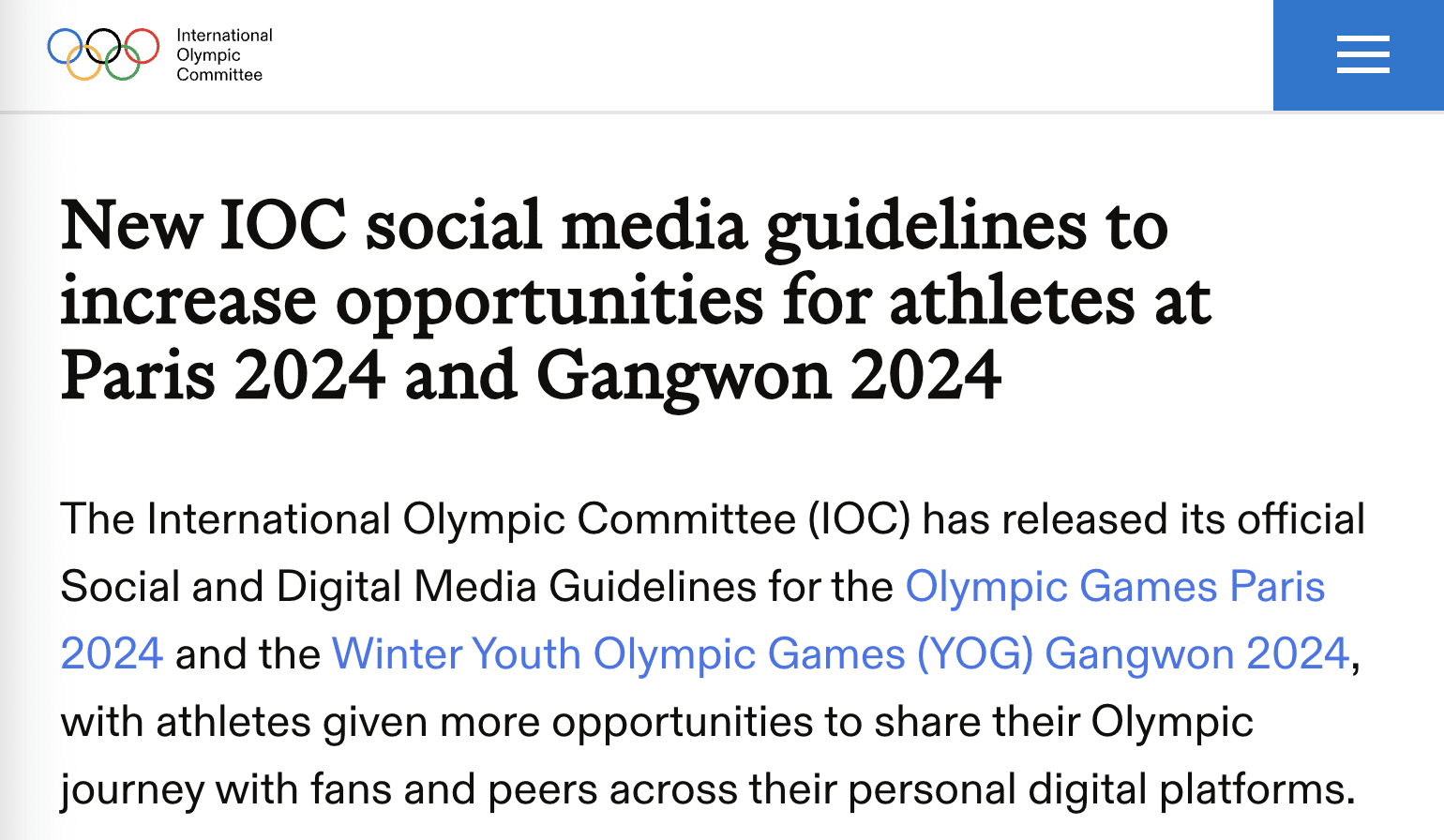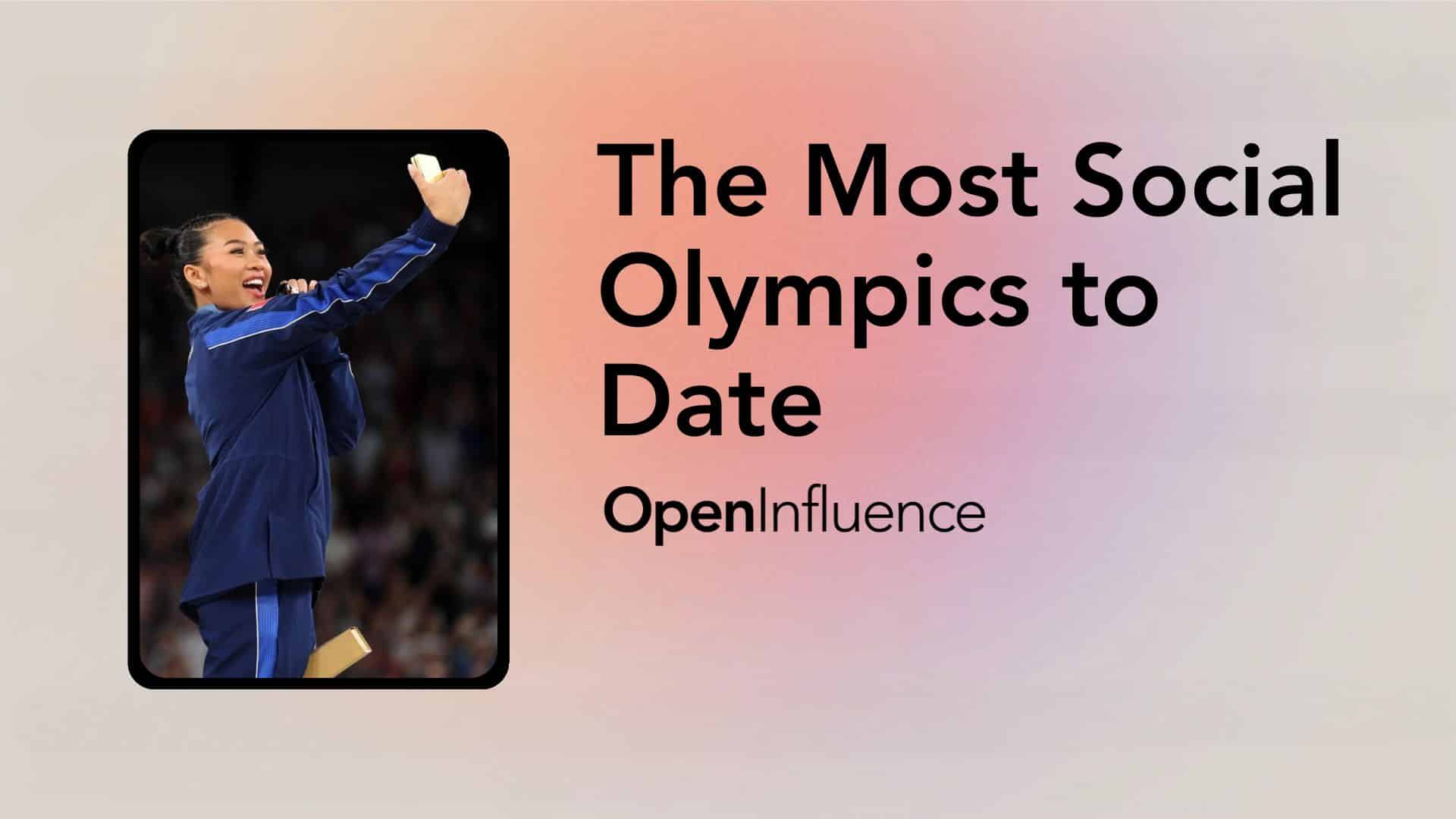The Maturing of TikTok, Relaxed IOC Guidelines Were Key Factors
The 2024 Summer Olympic Games in Paris have concluded and, while the stage rightfully belongs to the athletes who left everything they had on the track, in the water, on the court, or on the field, creators and social media platforms grabbed their share of glory more so than at previous Games.
Social networks in general remain strong, but TikTok has seen a dramatic rise in prominence since the 2020 Summer Olympics, which took place in Tokyo in 2021 due to the pandemic.
In addition to TikTok becoming a force in Olympics discourse by athletes, brands, and creators, the International Olympic Committee relaxed its social media guidelines compared with prior Games, providing far more freedom on what could be posted, and from where.
“The Olympics in marketing is a little bit like the Super Bowl, but it just happens to be every four years,” Open Influence Vice President of Creative Strategy Alexandra Mathieu said. “A lot of brands count on a lot of eyeballs to make marketing budgets count, and sometimes, you can almost hear the marketing shots being taken by big advertising executives and see them fall flat on big billboards and small scrollable screens.”
She continued, “Not this year, though. In 2024, Olympic marketing is landing like Simone Biles landing the Yurchenko double pike. Brands, teams, and creators alike seem to be posting and promoting in ways that feel proportional to the moments, allowing for authentic and socially native feel-good fun, athletic feat fandom, and fawning over favorite moments.”
@simonebilesowensTASTE GOLDEN ❤️🇺🇸💙♬ original sound – Satisfying Lips 💋
The IOC Loosens Its Grip
The new social media guidelines released by the IOC last December were aimed at doing a more equitable job of protecting official Olympics broadcasters and other media rights holders, while enabling participants to share more content and shine a spotlight on their sponsors.
At the 2020 Tokyo Games, which actually took place in 2021, athletes were forbidden from sharing Olympics social media content from accredited areas used for ceremonies or competitions, or posting about their personal sponsors.
However, at this year’s event in Paris, athletes were permitted to share audio, photos, and videos from inside and outside of accredited areas. They could also share images on their social media platforms up to one hour prior to the start of their competitions and immediately after exiting doping control areas.
Participants could also share posts from practice and training areas, the opening and closing ceremonies, and Champions Park, where athletes mingle with fans.
Among things they still couldn’t do: Livestream, post videos longer than two minutes, share other athletes training, post video from actual competitions, or share photos or videos created using artificial intelligence.
Athletes were also forbidden from posting for commercial purposes, such as to generate profits or promote third-party products or services.
There was one way for them to show their sponsors some love. The IOC wrote in the guidelines, “During the Games period, you may provide one simple ‘thank you’ message to each of your non-Olympic-partner personal sponsors, which can be posted to multiple platforms (posting a single identical message to multiple platforms must take place at the same time).”
Mathieu shared some thoughts about how the refreshed IOC guidelines benefited athletes, particularly those on TikTok.
“Four years ago, a pandemic was looming,” she said. “TikTok hadn’t reached the heights it has today, nor had the omnipresence of creator and content culture. It’s actually also wild to realize that we used to watch the Olympics from the outside. What was professionally recorded was what we saw, and only that. Now, while we get the point of view of ‘big cameras,’ we can also tune into the Olympic athletes’ POVs and their ‘day in the life,’ or an entire team’s lens, as well as friends, celebrities, and creators attending the Olympics, or the ones not attending but commentating.”

Social Media and the Olympics: Olympian Efforts by Social Media Platforms
TikTok
TikTok’s Paris 2024 Olympic Games feed was a one-stop shop for highlights shared by athletes, as well as conversation and information about the Games.
As an official partner, TikTok also made tutorials and workshops available to athletes to help them sharpen their creator skills, and the platform shared behind-the-scenes content from the Olympic Village, such as fashion hauls and training videos.
YouTube
The YouTube channels of official Olympics broadcasting partners were a destination for content like behind-the-scenes looks, commentary, highlights, on-the-ground moments, and replays.
The official Olympics channel shared archive content and highlights in select territories.
In addition, U.S. broadcast partner NBCUniversal brought creators including Haley Kalil, Kristy Scott, and Jeenie Weenie to Paris to share their unique perspectives from the Games, and Eurosport and the IOC itself did the same with creators such as Rick Azas, Liza Baez, Enaldinho, Paul Ferrer Z, Gabinouvilla, RJ Karishma, Robbie Lyle, Underrated Hijabi, and Tina Yong.
YouTube TV users were able to watch NBCU’s Games coverage with the multiview feature and in 4K.
Snapchat
Much like YouTube, official Olympics broadcasters shared behind-the-scenes social media content, daily wrap-ups, and highlights on the platform, as well as top moments from Olympic history, and they enlisted creators to share their takes on the Games in general and on Team USA.
The IOC teamed up with Snapchat and other commercial partners on augmented reality experiences, such as a lens that “transported” Snapchat users in Paris to the 1924 version of the city, while users worldwide could travel to Yves-du-Manoir Stadium in 1924, the last time Paris hosted the Games.
When the official poster of the 2024 Summer Games was scanned through the Snapchat application, it came to life, also via AR, and NBCU tapped AR to bring users to the front row of the opening ceremony and “meet” the Bitmojis of Team USA Olympians and Paralympians.
Snapchat and Coca-Cola teamed up on an AR vending machine in the athletes’ village that distributed games, photo opportunities, and prizes, along with beverages.
Finally, Snapchat users had access to a collection of filters and stickers related to the Games.
X
Despite the chaos that has enveloped the platform formerly known as Twitter since Elon Musk assumed ownership, X is still the preeminent destination among social platforms for real-time commentary and news.
X pitched brands on taking advantage of the second screen it provides, in addition to broadcasts of the Games, urging them to take part in conversations related to the event and drive engagement and reach that cannot be delivered by television.
The platform also provided brands with advertising opportunities including takeovers, custom executions, and Amplify, its premium video offering, which places brands’ preroll social media content adjacent to brand-safe content from official Olympic broadcasters.
Creators Will Always Have Paris
The days when the only way to enjoy the Olympics was by sitting in front of the television are no more. Now, social media and the Olympics are intertwined, allowing fans to engage with the Games in real-time, participate in global conversations, and experience the event through the perspectives of athletes and creators worldwide.
A study by United Talent Agency prior to the Paris Games found that 78% of U.S. respondents planned to watch Olympic events on social media, and 41% intended to engage with Olympic content on those platforms.
UTA also found that 75% of respondents who planned to watch the Olympic Games were more likely to watch social media coverage from celebrities, digital creators, and influencers than they were for the Tokyo Games three years ago.
The most popular social media platforms for Olympics content among U.S. respondents were:
- YouTube, 81%
- Instagram. 75%
- Facebook. 68%
- TikTok, 58%
- X, 37%
- Snapchat, 20%
- Threads, 10%
- Other, 1%
Celebrities and macro-influencers were everywhere to be found in Paris.
Snoop Dogg served as a special correspondent for NBC, while the U.S. women’s water polo team was sponsored by his hip-hop counterpart, Flavor Flav.
Podcasting giant Alex Cooper presented recaps in the style of her Call Her Daddy podcast on NBCU’s Peacock streaming platform. Cooper was joined on NBCU’s social accounts and Peacock by others including TikTok creator Clarke Peoples and YouTube creator Carter Kench.
Meanwhile, YouTube creator Kai Cenat and athlete-influencer Olivia Dunne were part of Snapchat’s team on the ground in France.
Brands got into the act, as well, with Samsung teaming up with actress Sydney Sweeney, while actress Sophia Bush and former U.S. women’s soccer player Ahslyn Harris took part in Uber’s On Our Way to the Olympics content series.
Spotlight on Peacock
Peacock turned to Open Influence and several TikTok creators to raise awareness of its Olympics streaming slate in the run-up to the Paris Games.
The creator-led package—featuring influencers including Sheree Denáe, Nick Jackson, podcast Just the Nobodys, Hannah Kosh, and Vetz Movies—highlighted Peacock-exclusive Olympic content.
“Excitement is growing for the Summer Games in Paris, and Peacock is keen to capitalize on that attention to showcase the many new incredible, industry-first interactive features for fans to completely customize their search and viewing experience on Peacock and make sure they don’t miss a moment,” Open Influence Senior Account Manager Brooke Moylan said prior to the start of the Games.
“This year’s Paris Olympics are shaping up as a true international sports and entertainment spectacle, an Olympics like no other, sure to produce iconic, can’t-miss moments,” she added. “To help tap into that excitement, Peacock developed several new ways for fans to view the Summer Games so that the audience can customize their experience and be a part of that global excitement, which creators uniquely highlighted throughout video content.”

Olympian Social Media Feats
In addition to leading the 2024 Summer Games with 126 overall medals and finishing in a first-place tie with China at 40 gold medals apiece, Team USA found the time to participate in TikTok trends such as classic dance celebrations, “everyone wants to know what I would do if I didn’t win,” and pass the phone.
Athletes who saw their follower counts skyrocket during the Games included Brazilian cyclist Gustavo Batista de Oliveira, Team USA rugby player Ilona Maher, Team USA pommel horse specialist Stephen Nedoroscik, and British hurdler Lina Nielsen.
Team USA’s Fred Richard helped propel the U.S. men’s Olympics gymnastics team to a bronze medal and then remained in Paris for more than one week after his event concluded to help boost his brand via his TikTok social media content.
Norwegian swimmer Henrik Christansen posted an entire TikTok series about the chocolate muffins from the Olympic Village cafeteria.
On the brand side, actor William Dafoe narrated “Winning Isn’t for Everyone: Am I a Bad Person,” a campaign for footwear and sportswear giant Nike featuring athletes including Giannis Antetokounmpo, Jakob Ingebrigtsen, LeBron James, Sha’Carri Richardson, Vini Jr., Serena Williams, A’Ja Wilson, and Qinwen Zheng.
Like Richard, Maher remained in Paris after the rugby events wrapped up, partly to continue working with Google on its campaign backing its Gemini AI platform.
Finally, another Olympic Team USA athlete, diver Tyler Downs, locked down a social media partnership with activewear brand Skims after posting a tongue-in-cheek video asking Skims Co-Founder Kim Kardashian for more gear. Downs ended up modeling that gear in several sponsored videos on TikTok.
Until Milano Cortina in 2026, Los Angeles in 2028
“Everyone can attend the Olympics as an outside viewer, reviewer, and commentator, or insider in the Olympic Village, behind the scenes and beyond,” Mathieu said. “We’re right there, if we want to be. We get to be so close to their extraordinaryness.”
She continued, “Add to that equation the fandom that exists over Paris as a total who’s who destination; the increase in marketers’ savviness as people tire of big spots with little impact and favor small posts with big fun, feats, and feels; and our general appetite for joyful content during a complex economic and political year alike, and you’ve got Olympic omnipresence: TikTok popularity, merged with social trends, the creator economy, the passion for Paris, plus marketing authenticity.”
Mathieu added, “The reality is that whether or not you are an Olympics lover, little and big Olympic feats and treats are sprinkled into your daily feeds regardless. From the muffin man Olympic Village stories, Simone Biles reapplying her Fenty makeup, creators tapping into their inner Olympian from the comfort of their home in gymnast-like bodysuits and on firm mattresses, the once-in-a-lifetime gravity-defying surfing photograph of Gabriel Medina going viral, people nerding ou) over the extraordinary feats of athletes, celebrations of the diverse and healthy bodies capable of extraordinary feats, or the full floor routines of Simone Biles that just floor everyone, the Olympics feats are in everyone’s feeds.”
While the 2024 Paris Games are in the history books, it will be fun to revisit the relationship between athletes, creators, and social media platforms at the 2026 Winter Olympic Games in Milano Cortina, Italy, as well as the next Summer Games, set for Los Angeles in 2028.
Mathieu concluded, “Did I say extraordinary feats enough? You can watch or not, but if you’re scrolling, you’re Olympics-ing.”
The Social Impact of the Olympic Games
The Olympic Games have long transcended their role as a global sporting event, emerging as a significant catalyst for social change and cultural exchange. The 2024 Summer Olympics in Paris were no exception, further amplifying their influence in the digital age. Creators and social media platforms played an unprecedented role in shaping the narrative of the Games, amplifying its reach, and engaging a broader audience.
Social media platforms played a crucial role in this shift, allowing athletes, creators, and fans to engage in real-time dialogue and share their experiences with a global audience. The democratization of media through platforms like Instagram, TikTok, and X enabled stories of personal triumph, social justice, and cultural pride to reach millions, igniting discussions and inspiring action far beyond the confines of the Olympic venues.
Moreover, the Games highlighted the role of athletes as influential voices in societal issues, with many using their visibility to advocate for causes such as mental health, gender equality, and environmental sustainability. This convergence of sports and social advocacy underscored the Olympics’ unique ability to bring people together, not only in celebration of athletic prowess but also in the pursuit of a more just and connected world.
In essence, the 2024 Olympics in Paris reaffirmed the event’s significance as a social and cultural phenomenon, where the impact of the Games resonated well beyond the competition, leaving a lasting legacy on the global community.






